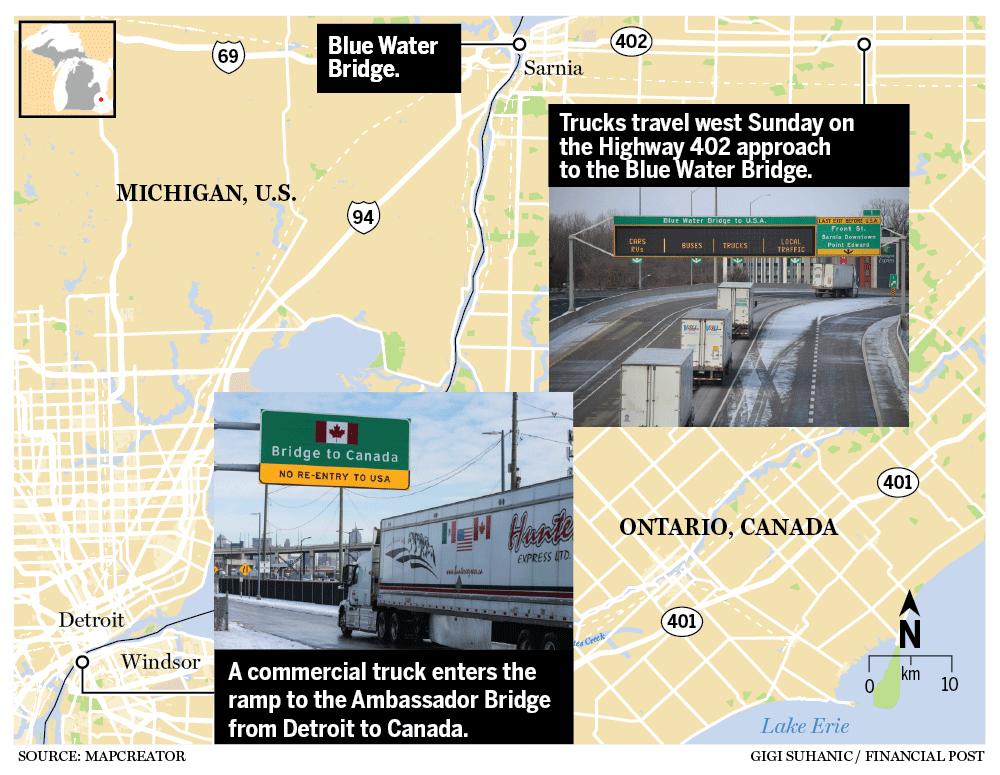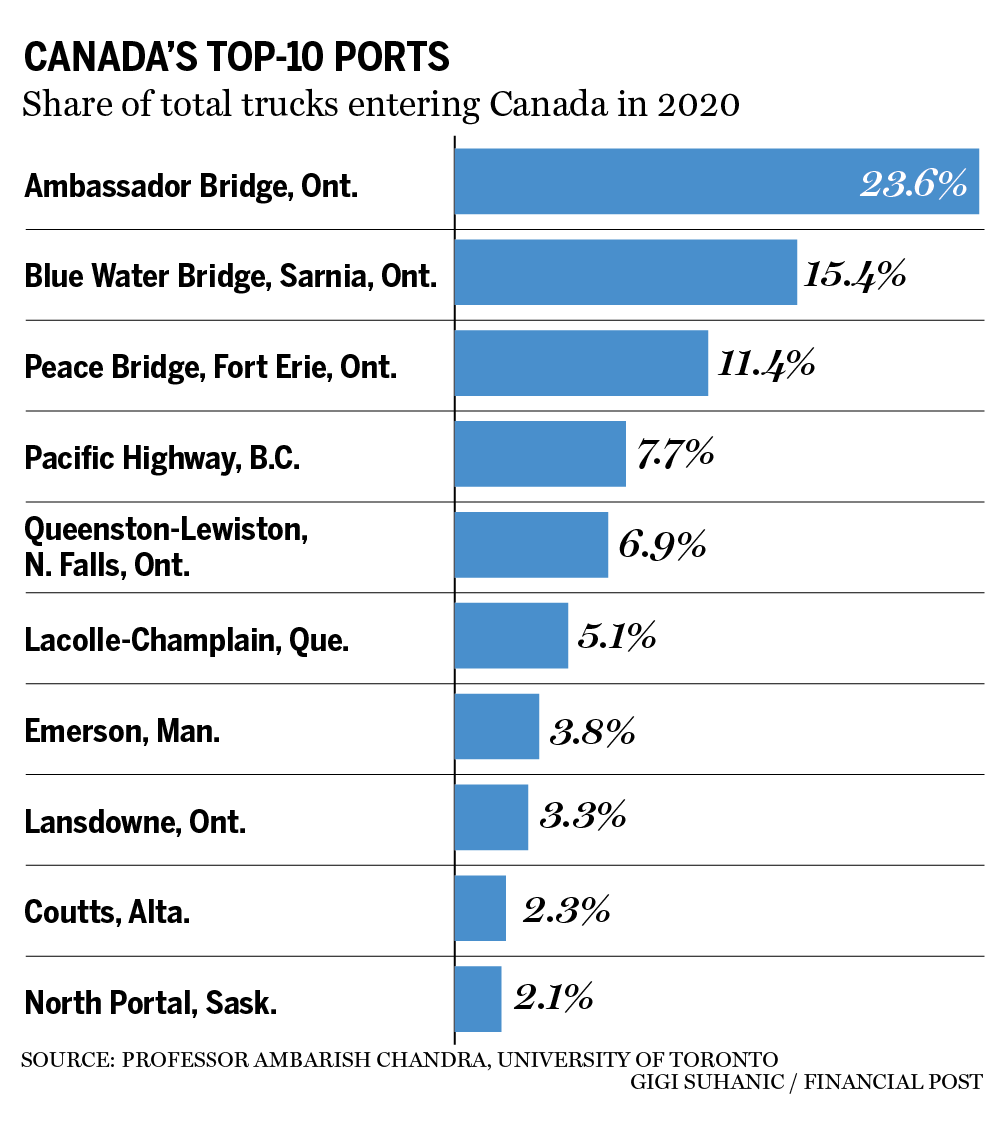Business leaders say Ottawa has work to do to restore trust in our trade
Article content
One of the most vital trade routes between Canada and the United States has reopened but the damage to Canada’s reputation and business has already been done, say some experts.
Advertisement
This advertisement has not loaded yet, but your article continues below.
Article content
On Sunday night, police in Windsor, Ont. cleared out protesters who had barricaded the Ambassador Bridge for nearly a whole week, beginning on Feb. 7. The bridge, which connects Windsor and Detroit, facilitates more than US$360 million in two-way trade daily and carries a quarter of the value of goods that flow between Canada and the U.S. In other parts of country, though, blockades continue.

Below is a breakdown on the impacts industry, trade and the economy face due to the border disruptions.
Industry
Ottawa has a lot of work to do to restore Canada’s credibility as a reliable supplier of goods, said the head of Canadian Manufacturers & Exporters.
This is especially true concerning the U.S., where American protectionist sentiment has been rising in recent years.
Advertisement
This advertisement has not loaded yet, but your article continues below.
Article content
“When we met with Minister of Transport (Omar) Alghabra last week, we said this is really important for you, from a reputational point of view, to show that you can manage to keep your trade quarters open with your biggest trading partner because of all the protectionist tendencies that exist in the U.S. right now,” Dennis Darby said in an interview. “The U.S. reacts to many things but anything that relates to its business, it reacts quickly.”
Darby represents 2,500 manufacturers and exporters in an industry that makes up 11 per cent of Canada’s gross domestic product, he said. His members make everything from cosmetics to chemicals and the barricades have exacerbated supply-chain shortages and the ability of companies to secure freight transport. Some will have to raise prices, he said.
Advertisement
This advertisement has not loaded yet, but your article continues below.
Article content
Meat producers are also feeling the strain, said Christopher White, president and CEO of the Canadian Meat Council. In Coutts, Alta., a pivotal crossing for the meat industry, protests blocking goods from passing into or out of Montana continue, causing food to spoil.
“Two other issues we’re hearing about is some truckers refusing to go to the States because they don’t want to get stuck in the blockade. And, there’s a limited amount of refrigerated trucks,” White said in an interview.
Flavio Volpé, head of the Automotive Parts Manufacturer’s Association, said his members have lost a week’s worth of production that they will not be able to make up. “There are a finite number of shifts and a specific volume of cars that are scheduled for a year. So, a factory that was going to make 300,000 cars this year will make 295,000 cars this year,” he said.
Advertisement
This advertisement has not loaded yet, but your article continues below.
Article content
The auto industry is already reeling from semiconductor chip shortages and staffing problems.
Volpé has been working with politicians in the U.S. to support the U.S.-Canada automotive supply chain. He spent days in Washington last November, lobbying congress members to reject a part of President Joe Biden’s infrastructure bill that gave a tax credit for buying electric vehicles made in America.
“I don’t know that I should show up to Washington this week,” Volpé said. “What would I say? What would I say when there are 30 pick-up trucks blocking the most important trade bridge on the planet?”
Trade
The protests that continue will add fire to politicians who already endorse protectionist trade policies, said Carlo Dade, director of trade and investment at the think-tank Canada West Foundation.
Advertisement
This advertisement has not loaded yet, but your article continues below.
Article content
“I wouldn’t overhype this and say that this is decisive and we’ll have orders cancelled left and right,” Dade said in an interview. “But you have to look at this as an accumulation of several events that have made it into foreign media.”
Canada has a history of people blocking trade routes, he said, whether it’s environmental protesters or Indigenous land-keepers fighting to save their territories from industry damage and encroachment.

“We’re trying to sell ourselves as reliable suppliers (of goods),” he said, adding that this protest is more severe and longer-lasting. “Those who are doing the blockading are actually the producers of goods that we ship abroad and the people responsible for shipping them.”
Ambarish Chandra, a professor at University of Toronto’s Rotman School of Management, said the blockades could add fuel to political fervour, but ultimately it’s private corporations that will decide whether to move operations to their home countries if trade is disrupted.
Advertisement
This advertisement has not loaded yet, but your article continues below.
Article content
The protests are “not really going to cause American firms to start actively looking to relocate but the longer this goes on,” he said, “then you could see companies make active plans to relocate.”
Dade added: “Blocking exports is, I would argue, a much more troubling signal and it’s being picked up. We’re tracking it in the form of media and we’re seeing 20 to 40 reports a day in papers in the Indo-Pacific.”
Economy
In the short-term, blockages at the border are going to put pressure on consumer prices and slow down economic growth, said Royce Mendes, director of macro strategy at Desjardins.
Before the protests, the Bank of Canada had forecast two per cent GDP growth, annualized, in the first quarter after the economy posted sizeable gains late last year. Many economists, including Mendes, now expect first-quarter GDP growth to be flat and inflation to surge as a result of shortages caused by the blockades.
Advertisement
This advertisement has not loaded yet, but your article continues below.
Article content
-

Ambassador Bridge standoff is over, but deep divisions remain
-

Blockades, fruit and the annoying impact of hiccups in the supply chain
-

‘We’ve got trucks sitting for hours on end’: As blockades drive up transport costs, fear of economic toll grows
“I don’t want to exaggerate the likely impact of all of this for either growth or inflation, but it is a step in the wrong direction on both of those fronts, rather than the hopeful steps in the right direction that we were expecting to see after the Omicron wave,” Mendes said in an interview.
The blockades won’t alter the Bank of Canada’s intentions to raise interest rates, though, Mendes said. Governor Tiff Macklem in January signalled that rate raises were coming and economists and analysts expect the first hike in March.
Still, the protests have inflicted some damage on Canada’s reputation as an attractive country for foreign investment. “One of the reasons we have been able to attract foreign investment is because of the ease of cross-border trade with the absolutely huge economy that is the U.S. If trade routes are not secure and not seen as secure and smooth, it reduces the appetite to create very integrated supply chains across the Canada-U.S. border.”
• Email: bbharti@postmedia.com | Twitter: biancabharti
Advertisement
This advertisement has not loaded yet, but your article continues below.
How the Ambassador Bridge blockade hit Canada’s economy — and our reputation
2022-02-14 20:53:43






